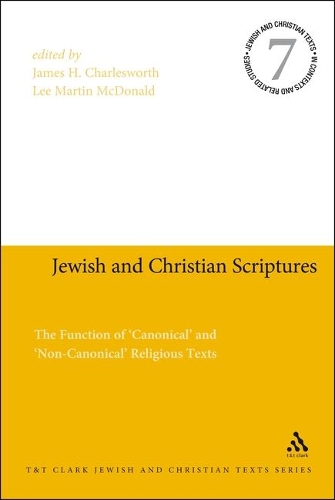
Jewish and Christian Scriptures: The Function of 'Canonical' and 'Non-Canonical' Religious Texts
(Hardback)
Available Formats
Publishing Details
Jewish and Christian Scriptures: The Function of 'Canonical' and 'Non-Canonical' Religious Texts
By (Author) Professor James H. Charlesworth
Edited by Reverend Doctor Lee Martin McDonald
Bloomsbury Publishing PLC
T.& T.Clark Ltd
27th May 2010
United Kingdom
Classifications
Tertiary Education
Non Fiction
Criticism and exegesis of sacred texts
229.06
Physical Properties
Hardback
256
Width 156mm, Height 234mm
524g
Description
Over the past four decades, many scholars have focused on the expanding collection of alleged "extra-canonical" documents that were deemed inspired by God in numerous early Jewish and Christian groups. Eventually, these texts ceased to have an authoritative role in Judaism and Christianity and were branded "extra-canonical." Now, these documents, once considered sacred, are recognized as fundamental in understanding antiquity, and the development of the canon. Many scholars are now according an authority to some of these texts This volume draws attention to these ancient religious texts, especially the so-called "non-canonical" texts, by focusing on how they were used or functioned in early societies. The contributors also warn us about the assumed barriers between "canon" and "extra-canon," "texts" and "traditions," and they suggest that we should be careful with labels such as "Jewish" and "Christian." The contributors also indicate, intermittently or implicitly, the importance of combining disciplines that had been isolated, especially the study of texts, the exploration of the canonical process, and the relevance of sociology in studying ancient groups.
Reviews
This volume contains some very scholarly and useful studies... -- Journal for the Study of The New Testament, Volume 33 Number 5
Author Bio
James H. Charlesworth is George L. Collord Professor of New Testament Language and Literature and Director and Editor of the Dead Sea Scrolls Project at Princeton Theological Seminary, USA. Lee Martin McDonald is President Emeritus and Professor of New Testament at Acadia Divinity College, Acadia University, Canada. He is also President of the Institute for Biblical Research.
